Switzerland’s stop-and-go march to vaccinate everyone by the summer
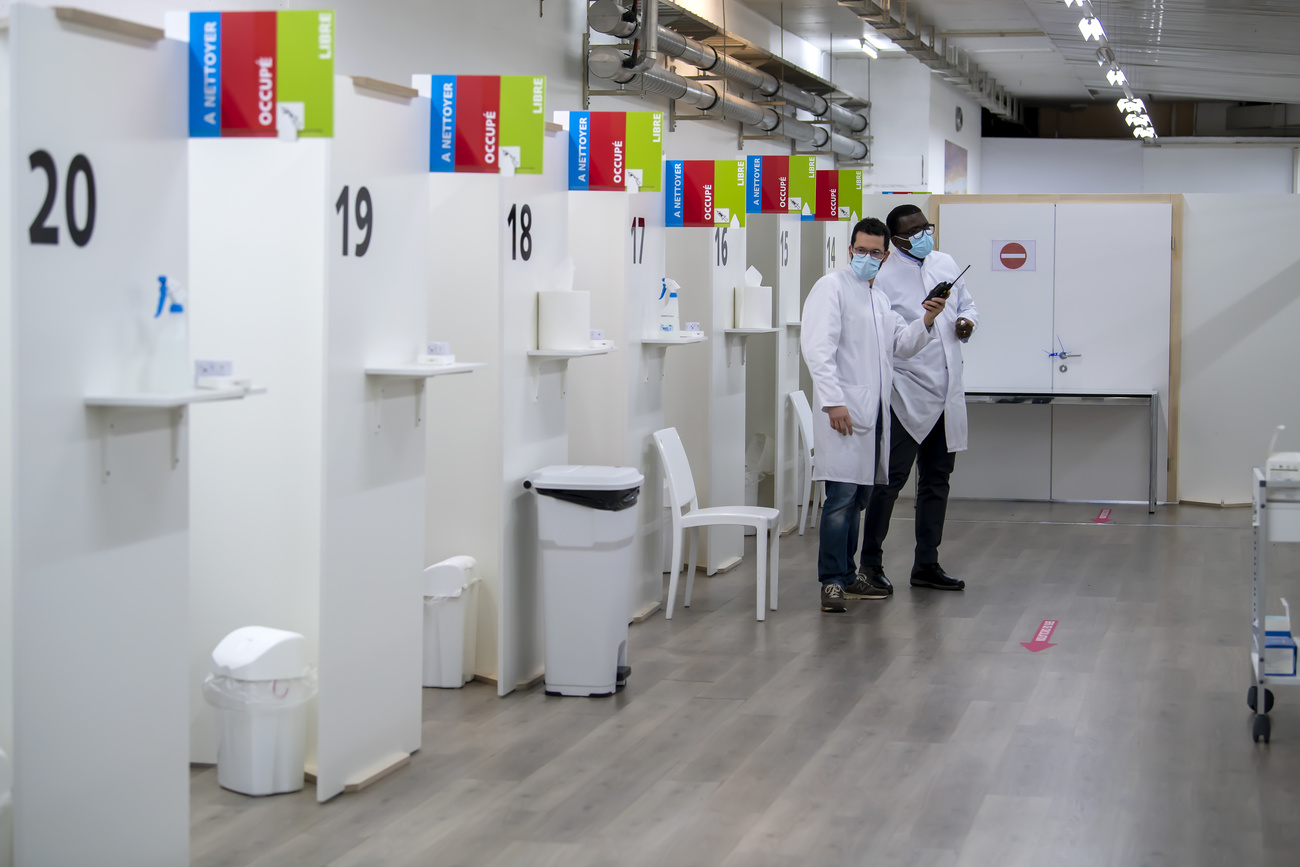
After a sluggish start, Switzerland’s Covid-19 vaccination campaign is picking up steam, with the goal to vaccinate anyone who wants to by summer. But its highly decentralised approach brings challenges.
Susanne Kuratli’s son set his alarm for 2am on Friday, January 8 – the first day people could sign up for vaccine appointments in Canton Bern. After filling out all the required information about his mother’s age, insurance and health conditions in the online registration page, appointment slots started appearing and disappearing faster than he could type.
He clicked accept as quickly as he could, securing an appointment for his 80-year old mother two days after the opening of Bern’s first vaccination centre on January 11.
“I feel great. I have the vaccine behind me, and I feel a little safer,” Kuratli told swissinfo.ch. “I wanted to get the vaccine as soon as possible to protect myself and others. I thought if I can free up a hospital bed for someone, I should do it.”
The process hasn’t gone as smoothly for everyone. The first few weeks of the vaccine campaign were filled with jammed phone lines, technical glitches and a frustrated public wondering why some parts of the country were starting faster than others.
A month after the first Covid-19 vaccination in Switzerland, there still isn’t a full nationwide picture of the number of people who have been vaccinated. Initial figures show that around 110,000 doses have been administered as of January 18 (1.27% of the population). By the end of the month, the government aims to reach 4% of the population, which is less than what Israel, the United Arab Emirates and the United Kingdom have managed to inoculate already.
Federal authorities have reassured an impatient public that they are on track to vaccinate anyone who wants to (estimated 6 million people) by the end of June. It got a boost last week when the Swiss drug regulator Swissmedic authorised the Moderna vaccine – the second vaccine after Pfizer/BioNtech.
The country now faces the daunting task of fixing existing problems while massively scaling up vaccination. As the country heads into a partial lockdown under the threat of a new strain, the task is even more urgent.
Staggered and slow
Switzerland gave the greenlight to the Pfizer/BioNtech vaccine on December 19, a few weeks before it had planned to launch the official vaccination campaign. The deal with Pfizer was only concluded less than two weeks earlier but this was still a month after Israel’s deal with the company, and for less than half the number of doses.
The authorisation was good news for the Swiss, but the late notice surprised some cantons and led to a mad dash to start vaccinating with less than perfect IT systems and infrastructure according to someone involved in organising a cantonal vaccine campaign. “We were planning to start in January, but when other cantons started vaccinating in December, we faced a lot of pressure from cantonal authorities to do so as well,” said the person who wished to remain anonymous.
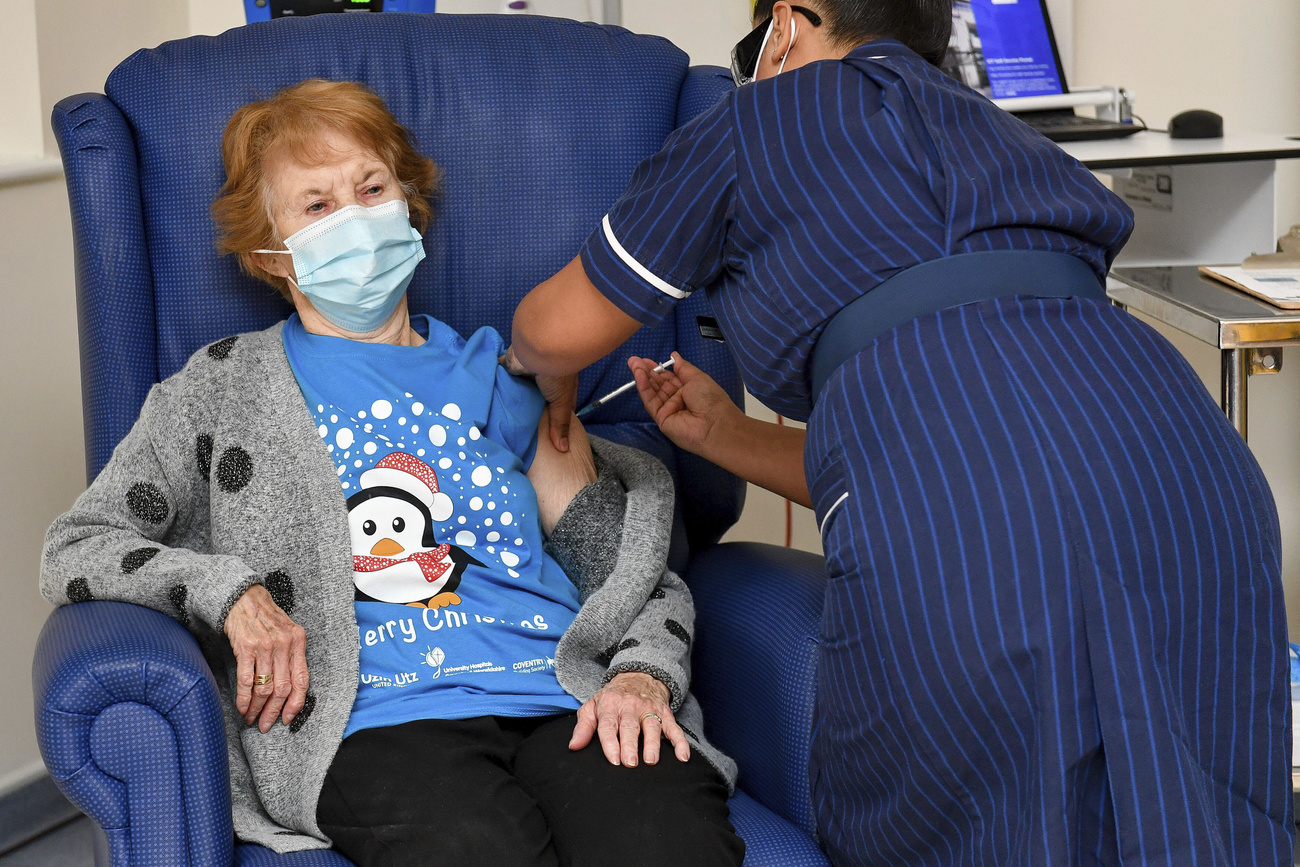
More
Covid-19 vaccine: Why we still have a long wait ahead
The first Pfizer shipment included 234,000 doses – enough to vaccinate about 115,000 people.
Distributed across 26 cantons based on population this meant that by January 13, Appenzell Innerrhoden, the smallest canton in Switzerland, received 400 doses, while cantons Lucerne had 10,000 and Vaud more than 19,000, spokespeople from those cantons confirmed with swissinfo.ch.
The initial Pfizer doses were the only ones available until last week when some 200,000 doses of Moderna arrived. Another 126,750 doses of the Pfizer vaccine were expected to arrive on January 18 but a production bottleneck reported on Friday meant only about half arrived. By the end of February, the government said a total of 1.5 million doses should be available, covering almost 11% of the adult population.
As we reported in December, rolling out vaccines to the masses could take months if not years as a result of limited manufacturing capacity. The 15.8 million doses ordered by the Swiss government from three manufacturers (the third is AstraZeneca) will be delivered when they are ready, sometimes with little warning, making it difficult for cantons to plan.
Several cantons contacted by swissinfo.ch before January 13 said they know the number of doses the government has promised to deliver to them by the end of February but don’t know exactly when they will be delivered or the number of doses in each delivery.
Most of them stressed that many factors were out of their control. “How and when the registration for vaccination can be opened for each target group depends on various factors, such as the quantity and type of available vaccine doses and substances, the willingness of the population to be vaccinated or the spread of the coronavirus,” summed up a spokesperson from canton Thurgau.
In contrast to Israel, which also has a population of around 8 million, Switzerland’s rollout is highly decentralised. The federal government secures and delivers doses and sets the overall vaccine strategy, but the 26 cantons are responsible for executing it.
Denmark, the UAE, Bahrain and Israel have all achieved higher vaccine rates than Switzerland with more centralised approaches. Some 29% of the population in Israel has received at least a first vaccine dose – far more than any other country.
Keeping the flow
For a highly decentralised approach like Switzerland’s to work, there has to be good two-way information flow, Prashant Yadav, a health and supply chain expert at the Centre for Global Development, told swissinfo.ch. The government gives cantons advanced warning when a shipment will arrive, but cantons are expected to report back how many doses are used.
Yadav argues that the backbone to such information flow is a strong IT system – something that is lacking in Switzerland according to sources and media reports. The public is told to visit their cantonal website to make an appointment, but this can be everything from a telephone line as in the southern canton of Ticino to a fully digitalised online questionnaire and appointment system in Bern and Geneva.
The system used in Canton Zurich crashedExternal link in just a few hours after thousands of people tried to make an appointment. Appointments for January are now fully-booked and the system is not expected to be back online to take appointments until the end of the month.
In an interview in the German-language paper Neue Zürcher ZeitungExternal link on January 5, Sang-Il Kim who heads digital transformation at the federal health office, said the government is pilot testing the online system OneDoc for registrations, appointment scheduling and vaccination data management for all cantons but there have been delays. Four cantons have requested their own system, complicating the process, he admitted.
More
In contrast, Israel’s digital medical records are centralised and used to identify people eligible for the vaccine, who then receive a text message with a link to make an appointment via an app. Everyone in Denmark has a digital personal information number that helps the government identify eligible people and map vaccination priorities.
Covid-19 requires more than an IT system though, said Yadav. “It is more about having a culture of trust and accountability” that information will be tracked, reported and used consistently and appropriately.
This is complicated by the fact that Switzerland doesn’t have a digital national immunisation register to rely on in contrast to many countries such as the Netherlands. The government encourages people to self-report in an electronic vaccine certificate (meinimpfung.ch) but this is largely for personal use, not for national monitoring. Estimates of vaccine coverage are based on regular surveysExternal link led by the University of Zurich with the cantons.
Moving target
Irrespective of what has been negotiated with suppliers, vaccine supplies are arriving slowly, not just in Switzerland, making it difficult to match supply and demand.
“Originally countries said we need to do this sequentially, which is vaccinate everyone of a certain group followed by the next group. And sequential works if you know that demand is clear but what countries are realising is that not everyone in phase 1 wants it. Then you have a surplus,” Yadav said.
He argued that simultaneous rollouts are possible, just as is happening in some US states.
But Switzerland remains cautious about opening the floodgates for people outside high-risk groups including people 75 years and up from getting the vaccine until they have a clearer picture on supplies. Canton Ticino has restricted the first doses even further to those 85 and up.
The decentralised approach is also allowing some cantons to diverge from national recommendations. Canton Vaud just announced it won’t allow people who have had a coronavirus infection to receive a vaccine right now, which runs counter to federal recommendations.
The federal health office has also not specified when the general public could get the jab but canton Lucerne has already published a projected timelineExternal link for vaccinations with the general population scheduled for June.
“I don’t think there is a one right answer on who should be vaccinated first,” Daniel Chulwoo Rhee from the International Vaccine Institute in South Korea told swissinfo.ch. “Once vaccines are refrigerated, they have to be administered as soon as possible. If the government deviates from its priority groups, it has to be clear about why it took the decision.”
Cantons contacted by swissinfo.ch said that they are vaccinating other groups to avoid wasting any doses. Michel Hassler, communication director of canton Aargau’s Health Department, said that in his canton, leftover vaccine doses are used to vaccinate staff in intensive care units in the evening. Zug also said they will vaccinate healthcare workers if doses remain.
The foreign ministry informed swissinfo.ch that “for logistical reasons, the vaccines that are used in Switzerland cannot be sent to the external network. Accordingly, there are no vaccine deliveries planned by the foreign ministry”.
If Swiss nationals abroad want to get vaccinated in Switzerland, they can but they have to pay for it themselves if they don’t have Swiss health insurance according to the federal health office.
Striking a balance
Decentralisation does have advantages: it allows cantons to decide how best to use their resources to reach people.
Many are transforming Covid-19 testing centres built in empty sports stadiums or warehouses into vaccine centres with the capacity to provide in some cases up to several thousands (in Bern for example) doses per day. Canton Vaud has six vaccine centres – all located in hospitals.
Some have exclusively focused on nursing homes or care facilities using mobile teams that go directly to homes. In Lucerne, around 90% of nursing home residents (around 4,200) had been vaccinated by January 15.
Monique Lehky Hagen, who is part of the medical society in Canton Valais, told Swiss public television RTS the strategyExternal link in her canton to focus on vaccination in doctors’ offices allows them to be more targeted with limited supplies and to help convince patients to get vaccinated.
While the Swiss army is protecting and delivering vaccine doses, stored in freezers at an undisclosed army location, cantons can also call on the civil protection corps to support their campaigns with tasks such as organising appointments at nursing homes where needed. Cantons St Gallen, Basel and Appenzell Ausserrhoden have opted to hire pharma logistics firm Galliker to transport vaccines at cold temperatures.
According to media reportsExternal link on the weekend, Health Minister Alain Berset is considering redistributing vaccines from low-performing to higher performing cantons in hopes of incentivising a faster roll-out. Some cantonal doctors have expressed support for a more “dynamic managementExternal link” or distribution of vaccine doses rather than based purely on population.
Trust is also an issue to take into consideration. The federal government has to strike a balance between the desire to move quickly and the need to mobilise the population. Although there is a sense of urgency to roll the vaccines out, the perception that corners were cut to speed things ahead could erode public trust.
“Safety issues may arise, and that message has to come from the federal government to ensure there isn’t any miscommunication”, said Daniel Chulwoo Rhee from the International Vaccine Institute.
The latest survey by swissinfo.ch’s parent company SRG shows that 41% of the population would get a Covid-19 vaccine immediately compared with just 16% in October. This is still lower than what is found in Denmark. One surveyExternal link found 79% of Danes were willing to receive the coronavirus vaccine.
Although its rollout has not been as fast or as smooth as some would hope, Switzerland is still part of a select group of around 40 wealthy countries that have received any doses at all.
“It is a privilege to get vaccinated. This is a chance for us older people. I’m very proud that I can be an example for others,” said Susanne Kuratli.

In compliance with the JTI standards
More: SWI swissinfo.ch certified by the Journalism Trust Initiative
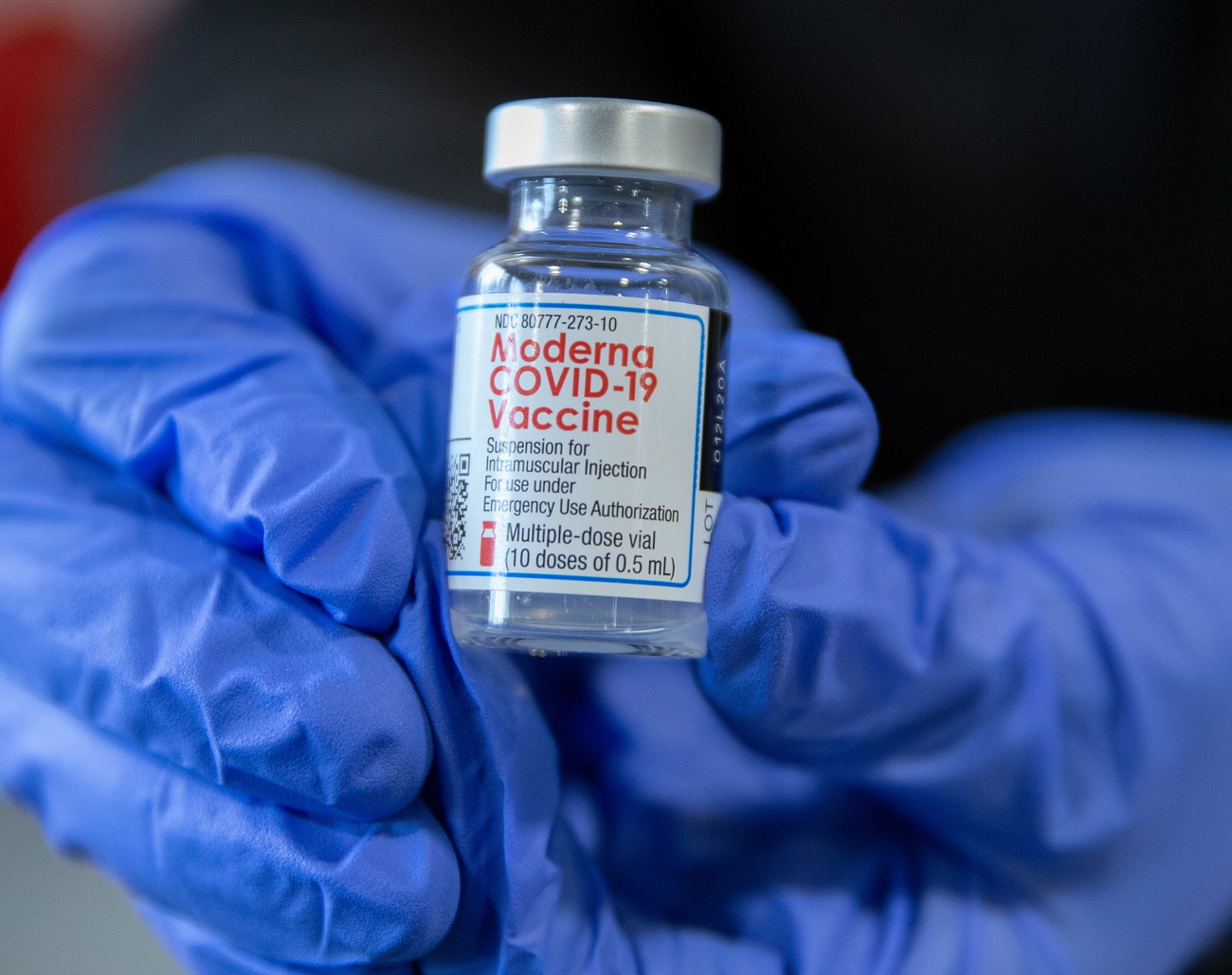
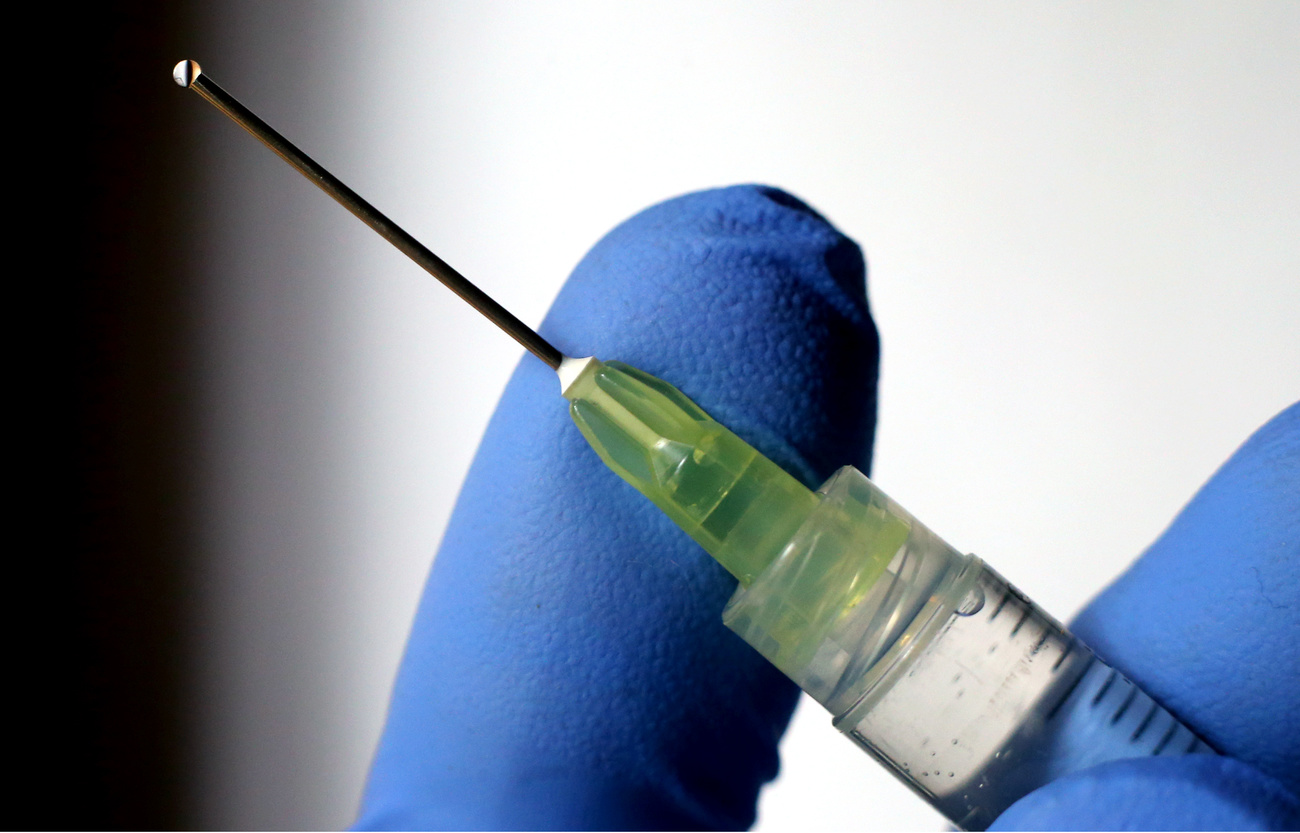
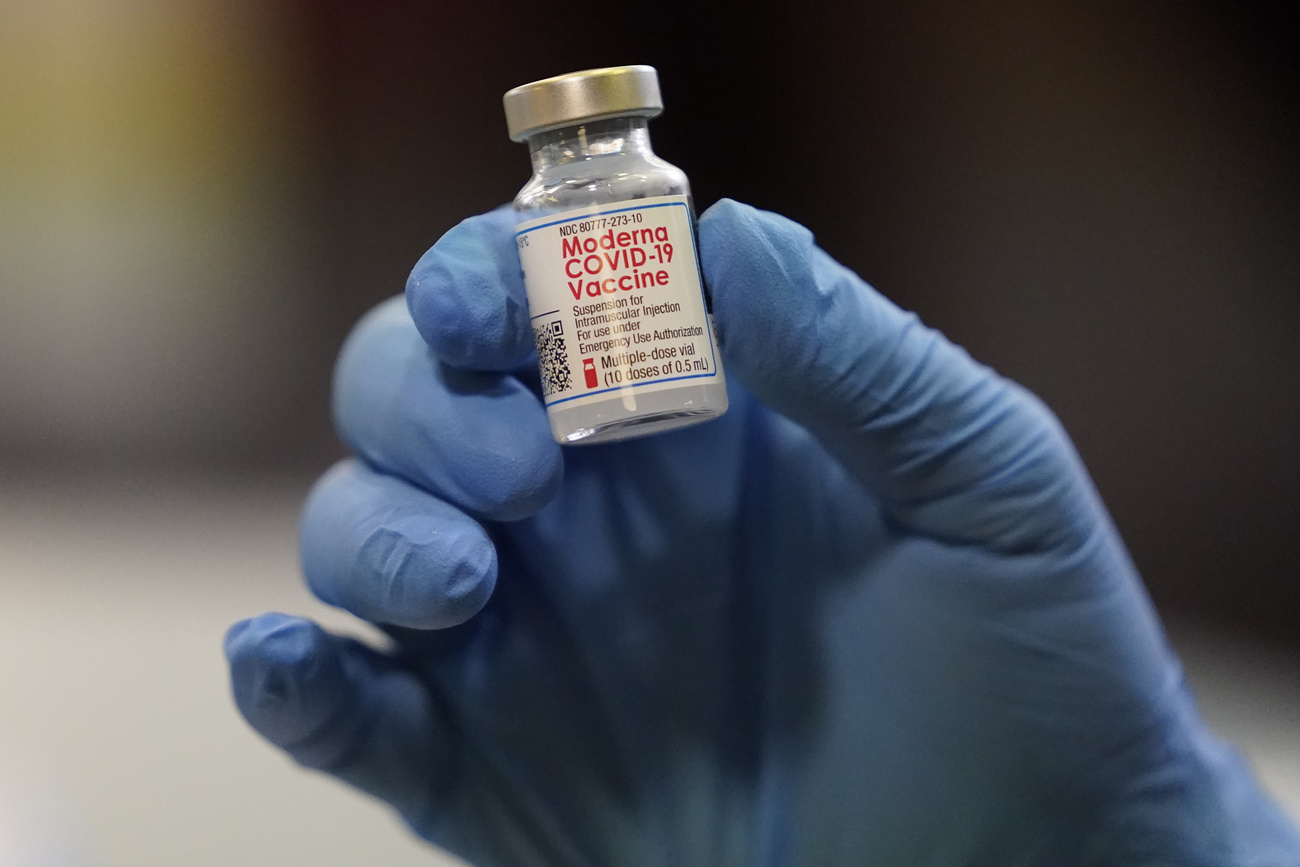
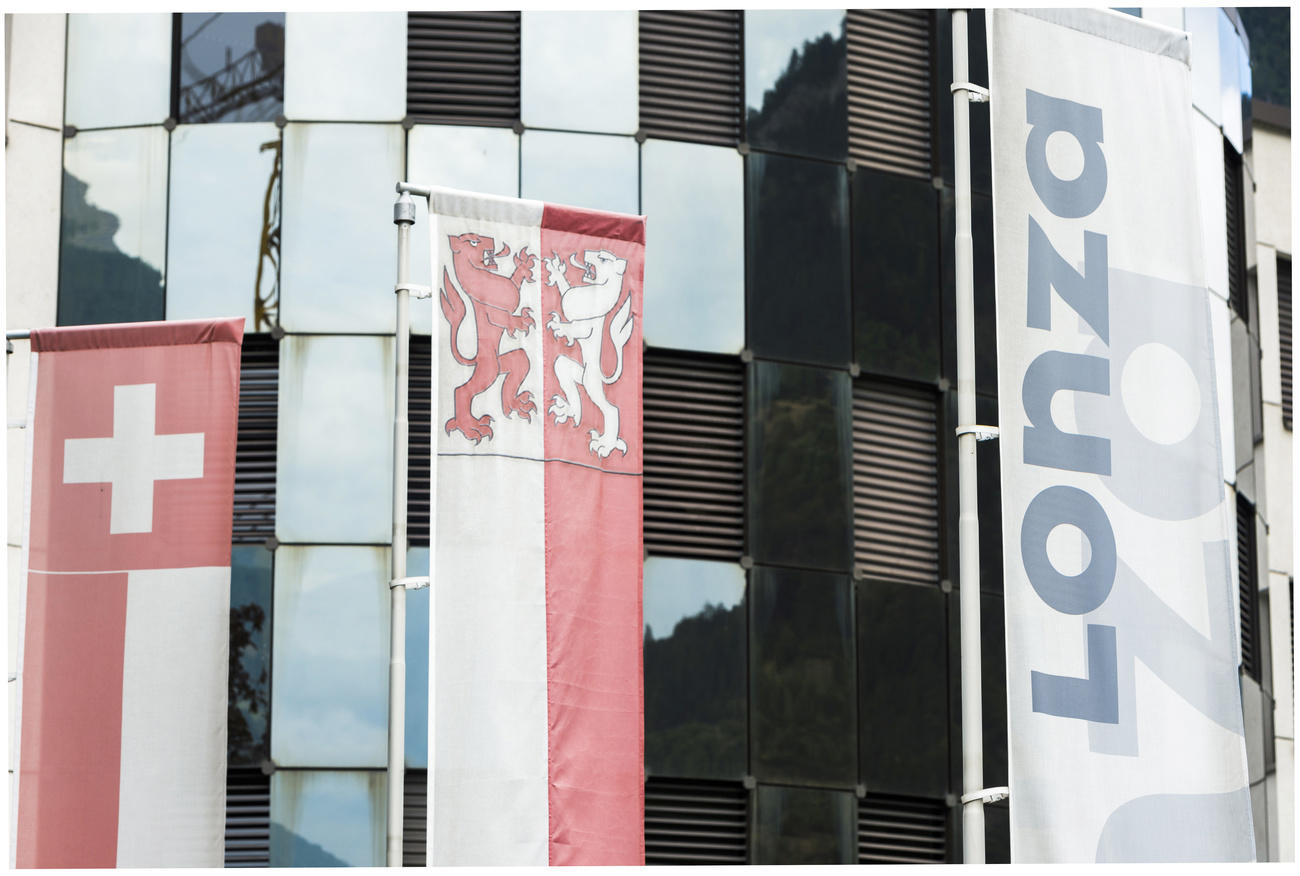
Join the conversation!